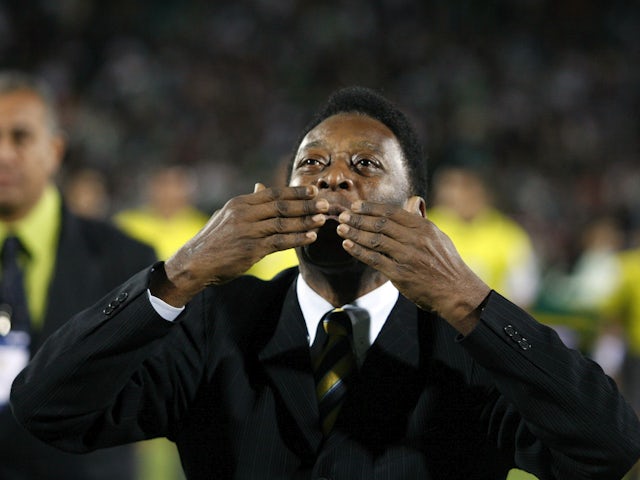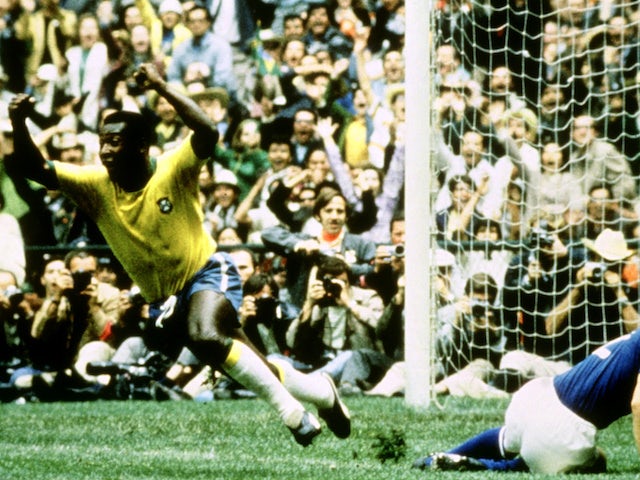Brazilian legend Pele, one of the greatest footballers of all time, has died in his home country at the age of 82.
The former striker had surgery for a tumour on his colon in September 2021, but his condition worsened over recent months and he had been at the Albert Einstein Israelite Hospital in Sao Paulo since November 29, with reports emerging during the recent World Cup in Qatar that he was receiving end-of-life care.
A hospital statement confirmed that Pele, whose original name was Edson Arantes do Nascimento, passed away at 3.27pm Brazilian time due to multiple organ failure resulting from his colon cancer.
A statement on his official Instagram account read: "Inspiration and love marked the journey of King Pele, who peacefully passed away today.
"On his journey, Edson enchanted the world with his genius in sport, stopped a war, carried out social works all over the world and spread what he most believed to be the cure for all our problems: love.
"His message today becomes a legacy for future generations. Love, love and love, forever."
During his legendary career, Pele scored a world-record 1,279 goals for club and country between 1956 and 1977, including 77 goals in 92 appearances for Brazil.
That figure has been questioned due to the inclusion of friendly matches Santos played across the world to capitalise on Pele's star power, although his widely-recognised official tally of 757 goals in 831 games is still one of the highest in the history of football.
The Brazilian was also the only player in history to have won three World Cups, lifting the trophy in 1958, 1962 and 1970.
Pele's daughter Kely Nascimento broke the news of his passing on Instagram, posting a picture of what appeared to be the hands of family resting on his body in a hospital bed.
 © Reuters
© Reuters
She added the caption: "Everything we are is thanks to you. We love you infinitely. Rest in peace."
Pele began his club career as a 15-year-old with Santos in 1956 and made his debut for Brazil's senior side just one year later.
The iconic former number 10 then burst onto the world scene at the 1958 World Cup, when as a teenager he scored a hat-trick in the semi-final against France and then a brace in the final as Brazil won the trophy for the first time in their history.
During that tournament in Sweden, Pele became the youngest player, scorer, hat-trick scorer and winner in the competition's history, while his first goal against Sweden in the final has been cited as one of the greatest in World Cup history.
Pele was less integral to Brazil's success four years later as they became the last team to retain the World Cup, with their star man suffering a tournament-ending injury in his second match.
However, in 1970 the Santos stalwart cemented his reputation as the greatest player of all time up to that point as the star in a team many believe to be the best in football history.
 © Reuters
© Reuters
The Minas Gerais-born superstar spent the vast majority of his club career with Santos, where he won 25 trophies and scored 643 goals in 659 appearances - a world-record with a single club until it was broken by Lionel Messi at Barcelona, although Santos claim that Pele's actual total was closer to 1,000.
After 19 seasons at Santos from 1956 to 1974, during which time he was allegedly blocked from leaving for a foreign club by Brazilian politicians such was his value to the country, Pele saw out the closing years of his career in the NASL with New York Cosmos following a brief semi-retirement.
The Brazilian was named FIFA's player of the century in 2000, sharing the award with Argentina legend Diego Maradona.
In addition to a host of other individual awards, Pele now shares Brazil's goalscoring record of 77 with Neymar, while he also boasts the best goals-per-game ratio in Brazil history - 0.84.
FIFA recognised his astonishing 127-goal tally from 1959 as the most ever scored in a calendar year, while he is also widely credited with scoring the most hat-tricks in football history (92).
A number of legends of the game have hailed Pele as the greatest footballer of all time, with the likes of Bobby Moore, Sir Geoff Hurst, Franz Beckenbauer, Johan Cruyff, Carlos Alberto, Ferenc Puskas, Alfredo Di Stefano and Michel Platini holding the Brazilian up above all other players.








